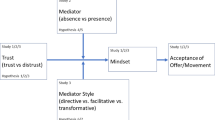Abstract
The impact of feedback on interpersonal learning in negotiation was examined. An interactive computer program was developed to isolate the effect of individual judgment on performance. Subjects negotiated three times with a computerized opponent whom they were led to believe was another subject. Some subjects received a complete diagnosis of their opponents' interests following each negotiation (full feedback); others only learned about their opponents' payoffs (outcome feedback); some did not receive any information about the opponent (control). The prediction was that subjects who received a complete diagnosis would make more accurate judgments about their opponents' interests and reach more integrative agreements in subsequent negotiation situations. The results provided weak support for the model. Two indices of performance were studied: negotiators' ability to recognize compatible issues and logrolling, or the ability to make mutually beneficial tradeoffs among issues. The pattern of findings was dramatically different for the two performance measures: Whereas logrolling improved as negotiators gained experience, recognition of compatible issues worsened over trials. The degradation of performance for compatible issues was curbed for negotiators who were provided with full feedback. The feedback did not affect logrolling performance.
Similar content being viewed by others
References
Ball S., Bazerman M. and Carroll J.: 1991, “An Evaluation of Learning in the Bilateral Winner's Curse,”Organization Behavior and Human Decision Processes 48, 1–22.
Bazerman, M.H. and Carroll, J.S.: 1987, “Negotiator Cognition,” pp. 247–288 inResearch in Organization Behavior (eds. L.L. Cummings and B. Staw)9.
Bazerman M.H., Magliozzi T. and Neale M.: 1985, “The Acquisition of an Integrative Response in a Competitive Market,”Organizational Behavior and Human Performance 34, 294–313.
Bazerman M.H. and Neale M.: 1983, “Heuristics in Negotiation: Limitations to Effective Dispute Resolution,” inNegotiation in Organizations (eds. M.Bazerman and R.Lewicki), Sage, Beverly Hills, CA.
Brehmer B.: 1980, “In One Word: Not from Experience,”Acta Psychologica 45, 223–241.
Carnevale, P. and Keenan, P.: 1989, “Decision Frame and Social Goals in Integrative Bargaining: The Likelihood of Agreement Versus the Quality,” Unpublished manuscript, University of Illinois.
Carroll J., Bazerman M. and Maury R.: 1988, “Negotiator Cognitions: A Descriptive Approach to Negotiators' Understanding of Their Opponents,”Organization Behavior and Human Decision Processes 41, 352–370.
Einhorn H.: 1980, “Overconfidence in Judgment,” inNew Directions for Methodology of Social and Behavioral Science (ed. R.A.Shweder), Jossey-Bass, San Francisco.
Einhorn H. and Hogarth R.: 1978, “Confidence in Judgment: Persistence of the Illusion of Validity,”Psychological Review 85, 395–416.
Hammond K., Stewart T., Brehmer B. and Steinmann D.: 1975, “Social Judgment Theory,” inHuman Judgment and Decision Processes (eds. M.Kaplan and S.Schwartz), Academic Press, New York.
Hogarth R.: 1981, “Beyond Discrete Biases: Functional and Dysfunctional Aspects of Judgmental Heuristics,”Psychological Bulletin 90, 197–217.
Kenny D.: 1984, “The Social Relations Model. InAdvances in Experimental Social Psychology (ed. L.Berkowitz), Academic Press, New York.
Lax D. and Sebenius J.: 1986,The Manager as Negotiator, Free Press, New York.
Nash J.: 1950, “The Bargaining Problem,”Econometrica 18, 155–162.
Nash J.: 1953, “Two-Person Cooperative Games,”Econometrica 21, 129–140.
Neale M.A. and Bazerman M.H.: 1991,Cognition and Rationality in Negotiation, Free Press, New York.
Neale M.A. and Northcraft G.: 1986, “Experts, Amateurs, and Refrigerators: Comparing Expert and Amateur Decision Making on a Novel Task,”Organizational Behavior and Human Decision Processes 38, 305–317.
Neale, M.A., Northcraft, G. and Earley, C.: 1990, “The joint effects of goal setting and expertise on negotiator performance,” Working paper, Northwestern University.
Pruitt D.G. and Rubin J.Z.: 1986,Social Conflict: Escalation, Stalemate and Settlement, Random House, New York.
Raiffa H.: 1982,The Art and Science of Negotiation, Harvard University Press, Cambridge, MA.
Snyder M., Campbell B. and Preston E.: 1982, “Testing Hypotheses about Human Nature: Assessing the Accuracy of Social Stereotypes,”Social Cognition 1, 256–272.
Snyder M. and Swann W.: 1978, “Hypothesis-testing Procedures in Social Interaction,”Journal of Personality & Social Psychology 36, 1202–1212.
Thompson L.: 1990a, “Negotiation Behavior and Performance: Empirical Evidence and Theoretical Issues,”Psychological Bulletin 108, 515–532.
Thompson L.: 1990b, “An Examination of Naive and Experienced Negotiators,”Journal of Personality and Social Psychology 59, 82–90.
Thompson L.: 1990c, “The Influence of Experience on Negotiation Performance,”Journal of Experimental Social Psychology 26, 528–544.
Thompson L.: 1991a, “Information Exchange and Negotiation,”Journal of Experimental Social Psychology 27, 161–179.
Thompson, L.: 1991b, “Interpersonal Learning in Negotiation,” Paper presented at the meetings of the Academy of Management, Miami, FL.
Thompson, L. and DeHarpport, T.: 1991, “Social Judgment, Feedback, and Interpersonal Learning in Negotiation,” Working paper, University of Washington.
Thompson L. and Hastie R.: 1990, “Social Perception in Negotiation,”Organization Behavior and Human Decision Processes 47, 98–123.
Walton R.E. and McKersie R.B.: 1965,A Behavioral Theory of Labor Relations, McGraw-Hill, New York.
Author information
Authors and Affiliations
Additional information
The research reported in this article was supported by a grant from the National Science Foundation #SES89211926.
Rights and permissions
About this article
Cite this article
Thompson, L.L. A method for examining learning in negotiation. Group Decis Negot 1, 71–85 (1992). https://doi.org/10.1007/BF00562691
Issue Date:
DOI: https://doi.org/10.1007/BF00562691




